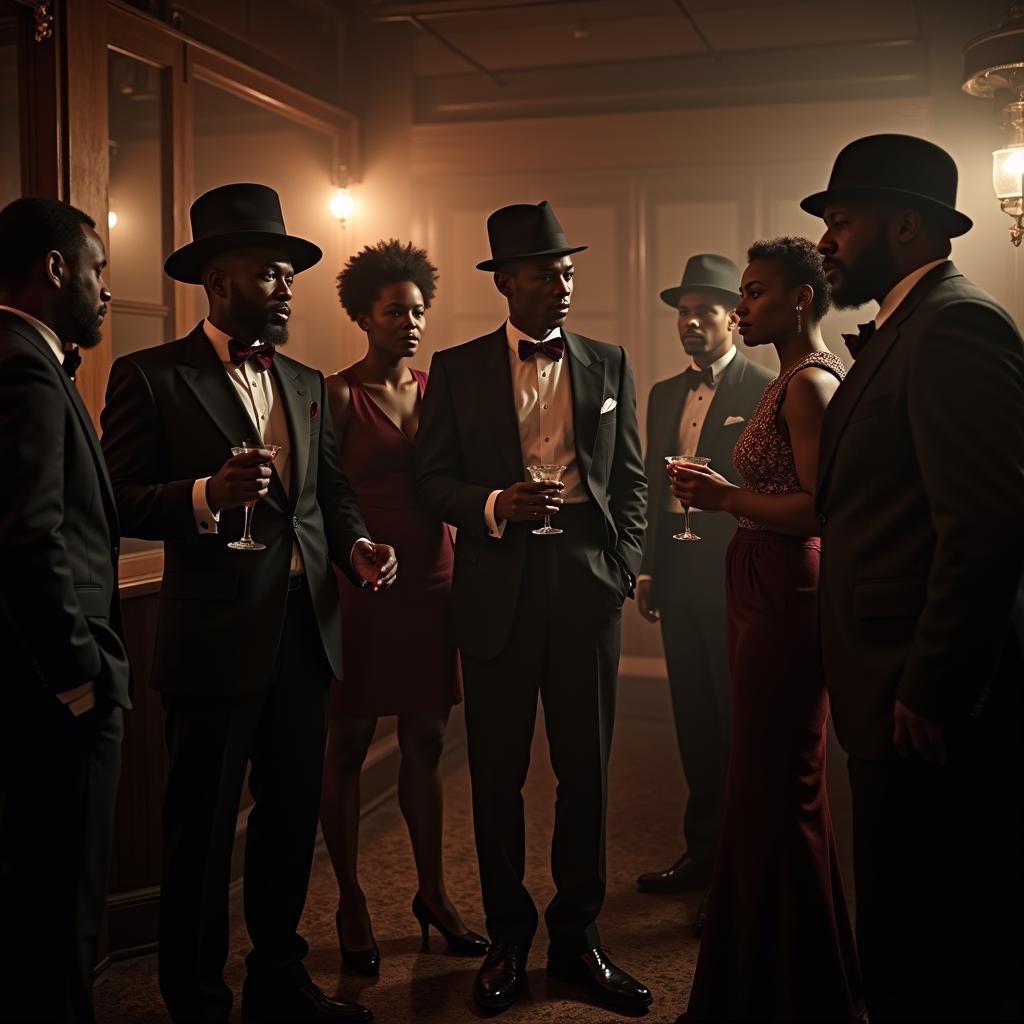The Complex History of African American Gangsters
African American Gangsters emerged within a specific socio-political context. Their stories, often romanticized, are deeply intertwined with systemic racism, economic hardship, and the struggle for power within marginalized communities. Understanding this history requires moving beyond sensationalized narratives and delving into the root causes that fueled their rise. This article aims to explore the complex history of African American gangsters, examining the societal factors that contributed to their emergence and the lasting impact on their communities.
From Prohibition to the Streets: The Rise of African American Gangsters
The Prohibition era of the 1920s and 30s provided fertile ground for the growth of organized crime in America, including among African Americans. Denied legitimate economic opportunities, many turned to bootlegging and other illicit activities to survive and gain power. Figures like Ellsworth “Bumpy” Johnson in Harlem became prominent, controlling lucrative underground markets and wielding significant influence. This period laid the groundwork for future generations of African American gangsters, establishing a pattern of criminal enterprise born out of systemic inequality.
The Great Migration saw millions of African Americans move from the rural South to northern cities in search of better opportunities. However, they often faced discrimination and segregation, limiting their access to jobs, housing, and education. This created a breeding ground for poverty and frustration, pushing some towards criminal activity as a means of survival and achieving the “American Dream” that remained elusive through legal avenues.
 African American Gangsters During Prohibition
African American Gangsters During Prohibition
The Post-War Era and the Evolution of Black Organized Crime
Following World War II, the landscape of organized crime shifted. While some African American gangsters continued to operate within established criminal networks, others formed their own independent organizations. These groups often focused on drug trafficking, gambling, and extortion, further entrenching themselves within their communities. This period also saw the rise of figures like Frank Lucas, whose heroin empire in the 1970s became infamous for its ruthlessness and reach.
The Civil Rights Movement, while aimed at achieving equality and justice, inadvertently created a power vacuum in some communities. As traditional power structures were challenged, some criminal organizations stepped in to fill the void, providing social services alongside their illicit activities. This blurred the lines between crime and community leadership, creating a complex and often contradictory dynamic.
African American Gangsters and the Media: Myth vs. Reality
How has the media portrayed African American gangsters? The media often portrays African American gangsters in stereotypical ways, focusing on violence and glamorizing their lifestyles. This perpetuates harmful myths and obscures the complex social and economic factors that drive individuals towards crime. It is crucial to critically examine these representations and understand the historical context behind them. Examining films and documentaries that offer nuanced perspectives can help separate fact from fiction.
What are some common misconceptions about African American gangsters? One common misconception is that all African American gangsters are motivated solely by greed and power. While these factors certainly play a role, the reality is far more nuanced. Many are driven by circumstances like poverty, lack of opportunity, and the desire to protect their communities. Understanding these motivations requires a deeper understanding of the systemic inequalities that continue to plague many African American communities.
african american gangster movies on netflix
The Legacy of African American Gangsters: Impact and Consequences
The legacy of African American gangsters is a complex one. While some figures are remembered for their philanthropy and community involvement, the overall impact of their activities has been largely negative. High rates of violence, drug addiction, and incarceration have devastated many communities, perpetuating cycles of poverty and inequality. Addressing these issues requires a multi-pronged approach that focuses on economic development, education, and criminal justice reform.
“The allure of quick money and power can be seductive, especially in communities where opportunities are scarce. But the long-term consequences of criminal activity are devastating, not only for individuals but for entire generations,” says Dr. Khalifa Hassan, a sociologist specializing in urban studies. “We need to invest in solutions that address the root causes of crime, not just the symptoms.”
Conclusion: Understanding the Complexities of a Troubled Past
African American gangsters represent a complex and often contradictory chapter in American history. Understanding their rise requires acknowledging the systemic racism and economic hardship that fueled their emergence. By examining the social and political context surrounding their activities, we can gain a deeper understanding of the challenges faced by marginalized communities and work towards creating a more just and equitable society. Moving forward, it’s crucial to continue exploring the historical narratives of African American gangsters with nuance and critical analysis, recognizing the complexities of their stories and the lasting impact on American society. Remembering the consequences of their actions is vital in breaking the cycle of poverty and violence that continues to plague many communities.
FAQ
- What were the primary factors that contributed to the rise of African American gangsters?
- How did the media portrayal of African American gangsters shape public perception?
- What is the lasting impact of African American gangster activity on their communities?
- Are there any positive aspects to the legacy of African American gangsters?
- What are some effective strategies for addressing the root causes of crime in marginalized communities?
- How did Prohibition contribute to the rise of African American gangsters?
- What is the connection between the Civil Rights Movement and the evolution of Black organized crime?
Situations Frequently Asked
-
Situation: I want to research the social and economic conditions that led to the rise of African American gangsters.
- Question: Where can I find reliable resources on the history of Black communities during the Prohibition era and the Great Migration?
-
Situation: I’m interested in learning about the media’s role in shaping public perception of African American gangsters.
- Question: Can you recommend any documentaries or academic articles that critically examine the portrayal of Black gangsters in film and television?
-
Situation: I’m looking for ways to support community initiatives that address the root causes of crime.
- Question: Are there any organizations working to improve economic opportunities and educational resources in underserved communities?
Related Questions and Articles
- Explore the history of organized crime in America.
- Learn more about the impact of systemic racism on African American communities.
- Research successful community programs that have reduced crime rates.
Call to Action
For assistance, please contact us:
Phone: +255768904061
Email: kaka.mag@gmail.com
Address: Mbarali DC Mawindi, Kangaga, Tanzania.
We have a 24/7 customer support team.
